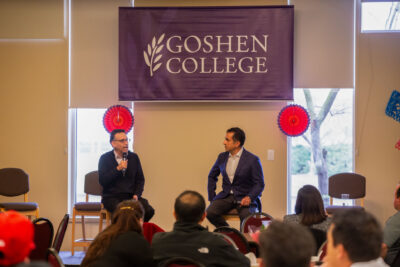If current global economic and agricultural trends don’t change, the results could be disastrous for the earth. This might not be a groundbreaking statement, but it’s one that has come into the spotlight at Goshen College since Wes Jackson addressed students and community members Tuesday night in Sauder Concert Hall.
Wes Jackson, author and founder of The Land Institute, spoke on Tuesday evening in Sauder Hall about his vision of a better global agricultural system. He said the popular mindset, “Nature should be subdued or ignored,” is one of the main reasons for the historically poor land stewardship by people. One of his personal goals, and goals of The Land Institute, is to undo the terrible damage done by traditional farming, which he believes is one of humanities most destructive activities.
The Land Institute has developed a perennial wheat grass that is better for land than traditional annual wheat that farmers grow; perennial wheat grass is more nutritious than conventional wheat. Jackson wants to slowly integrate this newly bred grain into the U.S. agricultural system.
“It’s going to be a big shift; it’s going to be a cultural shift,” said Jacob Maldonado-Nofziger, a first-year biology major. “It’s not just about planting perennial plants. We have to live in a way to support that style.” Jackson is aware that this change would take a lot of time, maybe 25-50 years, and many people won’t be willing to alter their lifestyle.
A discussion forum responding to Jacksons’ lecture was held yesterday morning. The forum was led by four members of the college community, each of whom brought a separate viewpoint to the discussion. The panel contributed their opinion of Jacksons’ speech, and people were invited to share their opinions about the previous night, and any questions they had for the panel. The topic of technological fundamentalism, the idea that technology will absolutely save us, was brought forth, although most of the panel members didn’t agree with this theory. “We’re not going to use technological fixes to get us out of this problem,” said Ryan Sensenig, professor of biology and environmental science. “What will get us out of this is restraint.”
Throughout the panel discussion, capitalism was often put on the hot seat as a reason for the poor agricultural stewardship of our world. Professor of Economics Jerrell Ross Richer was hesitant to put all the blame on capitalism itself; although he recognized that a change in the economic system was needed, he preferred the term "ecological economics." Ecological economics puts protecting the planet first, meeting the needs of the people second, and working on production last.
The need for economic and agricultural change is just one conclusion many members of the Goshen College community came to after hearing Jackson's lecture and participating in an informal discussion on Wednesday morning. Although there is no clear cut answer to this complex problem, “It’s important to ask questions for which there is no known answer,” said one of the members of the followup discussion forum.
Finding a way to use our technology and knowledge which behooves nature is a necessity for the future. As Sensenig said, quoting an essay by Jackson, “We need to make the tree of knowledge like a vine around the tree of life.”

